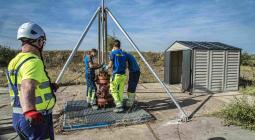Berlin agrees diminished plan for hydrogen back-up power plants
A German government agreement will create state support mechanisms for up to 10 GW of newly-built gas power plants, opening the way for carbon capture in the energy sector and may delay the country’s 2035 plan for a fossil-free power system.
In 2023, the German government shared plans to fund 15 GW of new gas power plants and 8 GW worth of novel facilities that would immediately run using hydrogen – 50 power plants.
But budgetary issues have seen these plans scaled back and instead, the German government looks to tender a total of 10 GW of gas-fuelled power plants in four successive auctions, according to a top-level agreement between Chancellor Olaf Scholz (SPD), the green Vice-Chancellor Robert Habeck and Finance Minister Christian Lindner (FDP).
Beyond that, the government wants to have more concrete proposals by Summer 2024 – by then, Berlin wants to progress on a future power market design and “in particular to develop concepts for a market-based, technology-neutral capacity mechanism.”
Much like in neighbouring Poland, where the government spends taxpayer money on ensuring sufficient power generation capacity is available, that would mean paying power plants for being at the ready.
This policy was supported by the liberal FDP. “I am delighted that our impetus for a capacity market has found its way into the federal government’s solution,” said Michael Kruse, the FDP’s spokesperson for energy policy.
The agreement on a power plant strategy “ensures that the supply of electricity is guaranteed in a climate-friendly manner even at times when there is little sun and wind,” the government said.
Capacity mechanisms are favoured by the energy industry. Meanwhile, experts are more sceptical – capacity schemes lack transparency and are subject to little competition.
“It’s fair to assume that industry’s favourable view of capacity markets is, among other reasons, driven by their flaws and the hope of being able to exploit them,” said Christoph Maurer, a German energy policy expert.
Like other political compromises struck in Berlin since 2021, the agreement features something for everybody. Technologies like nuclear fusion, an FDP favourite, are to be promoted “with suitable instruments.”
Another initiative championed by FDP and select members of the SPD is also acknowledged: capturing the CO2 emitted by gas power plants (CCS).
“CO2 capture and storage for electricity generation plants using gaseous energy sources will be addressed as part of the carbon management strategy,” the agreement reads. Using CCS in the power sector is among the more controversial aspects of the German carbon management strategy expected in Q1 2024.
Bidding farewell to a fossil-free power system
The agreement on the power plant strategy may have larger ramifications still. By 2035, the Greens had hoped to switch to an entirely climate-friendly power sector.
This plan looks to be quietly abandoned. The 10 GW of additional gas power plants will possibly have until 2040 at the latest to switch “entirely to hydrogen” – whether the 2035 date holds should be decided by 2032.
Brussels must now greenlight the plans, building on tentative approval from summer 2023.
Cover photo: The top-brass of the German government have agreed to subsidise the construction of 10 GW worth of additional gas power plants, down from 23 GW as per the initial plan. [EPA-EFE/CLEMENS BILAN]




